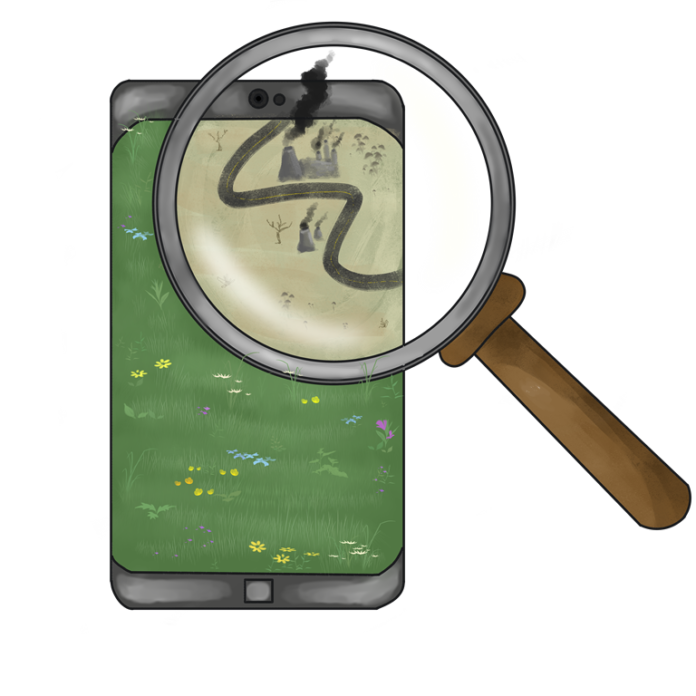I live and breathe all things social media. From MySpace to Tumblr to Facebook to YouTube to Instagram to TikTok, I’ve consumed content like no other. Information is power, and social media platforms give power back to the people (within the limits of community guidelines), as anyone can make a video, upload it, and share it with the world. Social media disseminates information, organizes revolutions, and shapes our culture.
These same platforms, however empowering they may be to the average creator, can also be polluted hellscapes of misinformation that scrollers passively absorb into their stream of consciousness. This is why it is so important to vet all the content we are reading, and especially all the content we are sharing.
Along with 42% of Canadians, social media is the primary way I learn about everything going on in the world, including news about our changing climate and tips for stewarding our environment. I’m going to give you four core questions you need to ask yourself when evaluating whether that hyperlink you clicked on holds its weight and is worth sharing to your followers, quoting in your next academic essay, or applying to your everyday life:
Is it reputable? The credentials of the author(s), their sources, and their publisher will tell you almost everything you need to know about whether a source is trustworthy. Credible new sources like The New York Times, The Narwhal, and The Cascade are all reputable sources that are thoroughly fact-checked. Peer-reviewed journals are another example of highly reliable sources of information, as these articles were written by experts in their field, and vetted by several other experts before they get published. If you’re looking for resources about which native plants would be best in your garden, getting information from organizations like the Fraser Valley Conservancy is a much better option than just some random person’s self-published gardening blog.
Another thing to consider is who is paying the salary of the journalists or researchers you are getting your information from. Steer towards sources that are independently funded (through readership fees), otherwise what they are saying (or not saying) becomes questionable.
Is it consistent with other sources? Don’t believe the first thing you read. Double and triple check with a few different reputable sources to see that this information is correct. If nine out of ten scientists say that the 2021 Fraser Valley floods were caused by a warming climate, and one source says it is just the natural rhythms of nature, take that into account.
Is it local? This is especially important if you are looking for information specific to caring for nature in the Fraser Valley. The more local the better. Say, for example, you wanted to add plants to your garden to help our local pollinators, so you do some research online about what kinds of plants would attract the most bees or butterflies or hummingbirds. You come across a few different sources about Canada’s declining monarch butterfly population and how we can help support them by planting milkweed. If you zoom in on where these sources are located, it is almost always in Eastern Canada, as monarchs migrate through parts of southern Quebec and Ontario. Not only do monarchs very rarely pass through the South Coast of B.C., but milkweed doesn’t like to grow in our Pacific Northwest rainforest climate. This is why it’s so important to get as local as possible, especially for advice on how to be good stewards of our natural world.
Is it recent? Always look for the most recent source possible. A journal article published ten years ago may have been disproven by now, or a newspaper article about a story that broke last year may no longer be relevant or applicable to the information you are trying to find. We are making new scientific discoveries and technological breakthroughs every day, and what we believed was true yesterday, may be disproven today. Take for example the types of materials each municipality accepts for recycling, starting Jan. 1 of this year, Recycle BC allows items like plastic straws and foam cups to go into your blue bin and more flexible plastics than ever before are accepted at recycling depots.
Next time you feel like sharing a tantalizing news story you found online with all your friends and family, run it through the filter of these four questions. When your opinionated Uncle Bob posts an op-ed article that denies basic scientific data and downplays the role that fossil fuel extraction plays in our warming climate, forward him this article. Reject apathy and encourage people who spread misinformation to take on the responsibility of vetting their sources before sharing them online.
If you’re looking for fun, applicable, and reliable information about how to connect with and protect nature in your local community, follow @steptoit on Instagram, Facebook, and TikTok!
Andrea Sadowski is working towards her BA in Global Development Studies, with a minor in anthropology and Mennonite studies. When she's not sitting in front of her computer, Andrea enjoys climbing mountains, sleeping outside, cooking delicious plant-based food, talking to animals, and dismantling the patriarchy.


